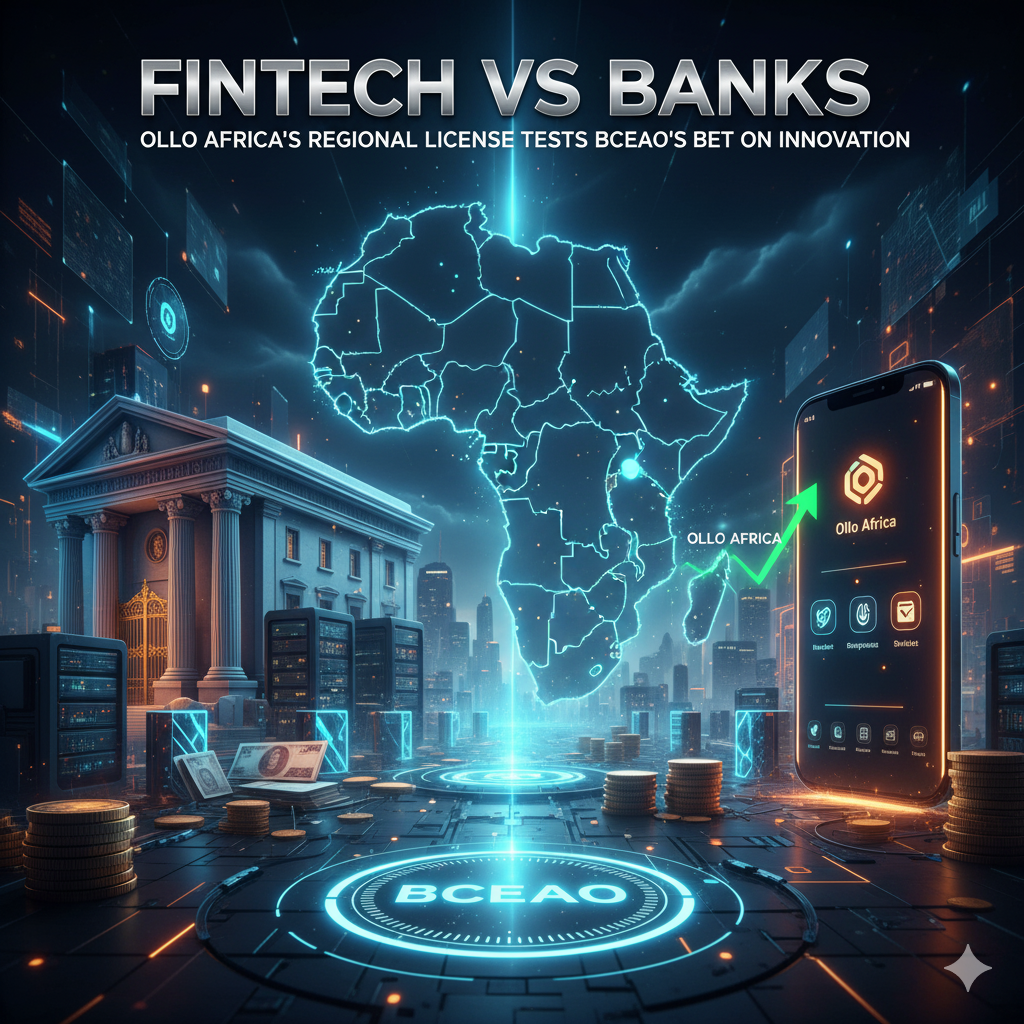Fintech vs Banks: Ollo Africa’s Regional License Tests BCEAO’s Bet on Innovation
Ollo Africa, now Togo’s first fintech with a BCEAO regional banking license, can scale from 8M to over 150M customers across WAEMU. The move raises investor hopes for a valuation leap, but execution risks—credit, liquidity, and compliance—will determine if this is a breakout or a cautionary tale.

Ollo Africa has become the first Togolese fintech to win a regional banking license from the BCEAO, a landmark that reshapes its trajectory from a domestic disruptor to a pan-regional challenger. For investors, this step opens a vastly larger market. Instead of competing only in Togo’s 8 million-person economy, Ollo now has access to more than 150 million potential customers across the eight WAEMU states.
The license lifts Ollo beyond payments and wallets into core banking: deposit mobilization, SME credit, remittance services, and foreign exchange across borders. WAEMU is fertile ground. Banking penetration averages 23–25%, leaving most adults unbanked. By leaning on mobile infrastructure—smartphone penetration exceeds 80%—Ollo can target the mass of under-served customers that traditional branch networks rarely reach.
From a valuation perspective, the step could be transformative. Nigerian peers such as Flutterwave (valued at ~$3 billion) and Interswitch (~$1 billion) have shown how fintech scale attracts global capital. In East Africa, M-Pesa, under Safaricom (SCOM.NR), handles transactions exceeding $100 billion annually, anchoring Kenya’s financial system. Ollo is far smaller today, but the leap from a national to a regional license multiplies its addressable market nearly twentyfold. With execution, its valuation ceiling rises dramatically.
For listed comparables, African banks trade at wide spreads. Ecobank Transnational (ETI.LG), based in Lomé, trades at a P/B near 0.4 and P/E of ~6.5, reflecting balance-sheet pressures and legacy costs. By contrast, South Africa’s Capitec Bank (CPI.SJ)—a tech-leaning retail bank—trades above 20x earnings, showing the premium investors place on scalable, digital-first models. If Ollo demonstrates regional traction, its profile could migrate toward the Capitec template rather than the low-multiple incumbents.
Competitive dynamics in WAEMU may shift quickly. Traditional banks remain slow to digitize, often prioritizing corporate lending and leaving retail and SME markets underserved. Ollo’s ability to launch mobile credit, low-cost deposits, and instant transfers across borders poses a genuine threat to these franchises. With low financial inclusion but high mobile penetration, the terrain favors digital entrants.
Yet risks loom large. Regulatory compliance is costly: capital adequacy, AML/KYC, and BCEAO’s cross-border oversight require heavy investment in systems and governance. Liquidity management will be complex, coordinating treasury operations across eight states within the CFA franc framework. Credit risk is another exposure. With thin credit bureau coverage, underwriting must rely on alternative data. Missteps here could inflate defaults and erode margins.
Macro and political conditions add layers of uncertainty. WAEMU has endured coups in Mali, Burkina Faso, and Niger, stressing the bloc’s cohesion. Regional treasuries face fiscal strain, with CFA-denominated yields hovering above 8–10%. Weak sovereign balance sheets and political instability can ripple into banking systems, raising systemic risk for new entrants like Ollo.
Despite these headwinds, the long-term opportunity is powerful. The BCEAO license signals regulatory openness to digital banking. If Ollo executes well, other fintechs in Senegal, Côte d’Ivoire, or Benin could follow, spurring wider interoperability. Investors will watch early indicators closely: customer acquisition across multiple states, deposit growth, net interest margins, and NPL ratios as lending ramps. Partnerships with telcos or incumbent banks could also accelerate adoption.
For investors, the scenario is high-growth but high-risk. The upside is clear: Ollo could evolve into one of the first cross-border digital banks in Francophone Africa, capable of competing with both incumbents and pan-African giants. The downside is equally real: compliance costs, liquidity traps, or macro shocks could overwhelm a still-young platform. Valuation re-rating depends on proving that scale can translate into sustainable profitability.
Ollo Africa’s approval is thus both symbol and stress test. It multiplies the market potential, signals regulatory flexibility, and sharpens competition in a chronically under-banked region. Yet whether this becomes a launchpad for a valuation breakthrough or a cautionary tale will hinge on execution over the next 12–24 months. Investors now have front-row seats to a rare experiment: a fintech vaulting from local licensee to regional bank under one of Africa’s most ambitious regulatory regimes.





